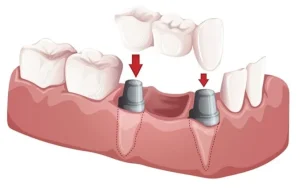When you lose a tooth, it’s more than just a gap in your smile. It affects eating, speaking, and even your self-image. Dental implants offer a modern solution that brings back both function and confidence. This guide walks you through what you need to know about the journey toward getting implants.
Understanding Dental Implants
At their core, dental implants are titanium screws placed into the jawbone to serve as artificial roots. On top of these, dentists place crowns or bridges that look exactly like natural teeth. Because they fuse with the bone, they provide a strong and permanent foundation.
Why People Prefer Implants
Unlike dentures, implants don’t slip or cause discomfort. They allow you to eat your favorite foods, smile confidently, and maintain oral health. One hidden benefit is how they prevent jawbone shrinkage, which often occurs when teeth are missing for a long time.
Steps Involved in the Procedure
-
Initial Check-Up
Your dentist will assess your gums, bone structure, and overall health to see if you’re ready for implants. -
Surgical Placement
The implant is surgically inserted into the jaw. Healing time is crucial at this stage to allow the implant to bond with the bone. -
Healing Period
The bone integrates with the implant over several months, making it as strong as a natural root. -
Abutment and Crown
Once healed, an abutment is attached to the implant, followed by a crown that matches your natural teeth.
Candidacy for Dental Implants
Not everyone can immediately get implants. Good gum health, adequate bone, and overall fitness are essential. People with habits like smoking or health conditions such as diabetes may require extra care or preparatory procedures.
Post-Treatment Care
Taking care of implants is very similar to maintaining natural teeth. Daily brushing, flossing, and regular dental visits ensure their longevity. Avoiding tobacco and following your dentist’s advice further enhances their success rate.
Common Myths About Implants
-
They are painful: With modern anesthesia, the procedure is usually painless.
-
They don’t last long: With proper care, implants can last a lifetime.
-
They are only cosmetic: Implants also restore function and prevent bone loss.
Cost Consideration
Implants may seem expensive at first, but compared to dentures that need constant repairs or replacements, implants prove to be more cost-effective in the long run.
Conclusion
Dental implants are a reliable solution for missing teeth. They combine strength, durability, and a natural look, making them one of the best treatments for restoring smiles. With the right dentist and good oral care, your implants can be the key to a confident and healthy future.







